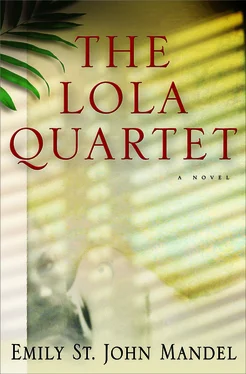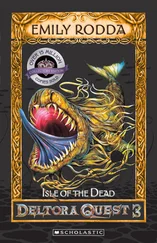Step inside and it was just another bar, all chatter and shadows and the faint smell of stale beer, but at the back of the room was a window, a red paper umbrella attached to a wall, a doorway covered by a velvet curtain. The window was almost soundproof. From the dark of the bar he would stand and look through into a brighter world, a small room with a lit-up sign that read Hotel d' Orsay and a few rows of people sitting on uncomfortable chairs. Under the Hotel d' Orsay sign musicians set up their instruments, plugged in their amplifiers, milled about drinking beer while the audience stared at them, tested the mikes at their leisure, eventually got around to settling down behind their instruments, and then played some of the finest music Gavin had ever heard.
At Barbès he was at his best, his calmest and least desperate. He'd been obsessed with jazz in high school and listening to it again was like coming home. He'd had a friend in high school with a touch of synesthesia who saw light when he heard music, and he liked to think of this when he listened. He could lose himself in the music for a while and he sometimes felt that he was a part of something that mattered, a witness to evenings that might be written about later on.
He was there for Deval & Morelli's last performance, for example. They were a guitar duo who played the nine o'clock set on Mondays. Their last performance was on a cool night in May toward the end of things, some time after Gavin had run out of cash and had started paying for everything with credit cards. He didn't know if Arthur Morelli and Liam Deval were famous in any widespread, conventional way— there were so many gradations of fame now, it was hard to tell anymore what kind of fame counted and who stood a chance of being remembered later— but he thought they were brilliant and on the nights when they played the room was packed. Gavin went every week and stood at the back so he could duck out easily before the tip bucket for the musicians was passed around. He felt bad about this, but he had no cash anymore.
Arthur Morelli was older, an unsmiling man in his late thirties or early forties who played with a heavy swing. In his solos he wheeled out into wild tangents, he pushed the music to the edge before he came back to rhythm. Liam Deval looked about Gavin's age, late twenties or early thirties, the star of the show: a perfect counterpoint to Morelli, all shimmering arpeggios and light sharp tones. Gavin had never seen anyone's hands move so quickly. His skill was astonishing. Jazz slipped into gypsy music and back again, a thrilling hybrid form. Gavin knew it wasn't new, what they were doing, but it was the first time he'd encountered it live. There was a bassist and occasionally a drummer, one solo each per set but otherwise strictly backup. Everyone was backup to Liam Deval, including Morelli. It was obvious that they were a duo in name only.
They played the nine o'clock set every Monday, until a particular night in June when it seemed to Gavin that there was tension between Deval and Morelli during the first set. They took a break, during which they murmured inaudibly but furiously in a back corner. They started the second set unevenly. Something was off— Morelli was glaring at his guitar and when he took a solo he went too far out and the beat was lost. Deval's glissandos were ungrounded. The guitars went subtly but maddeningly out of sync. The bass player closed his eyes and struggled to keep the rhythm. When the short set was over they packed up their instruments without looking at one another. Deval slung his guitar case over his back and walked out of the room without a word. Morelli looked up at him when he left, his expression unreadable. The bass player was glowering and wouldn't look at either of them. Morelli left a few minutes later, and after that the nine o'clock set on Mondays was a large beautiful woman with squared-off bangs and red lipstick who played exquisite melodies on a ukulele, a dreamlike wave of strings and horns and soft drumbeats rising up behind her.
J u l i e s e n t him an email. She wanted to know if there was anything he wanted to tell her. There was, there was, but he sat paralyzed for some time before he managed it. "Some of this you already know," he wrote, but he listed them all anyway: the woman in the Florida story whose name wasn't Chloe, the imaginary concerned parent in the Bronx playground with the child who also didn't exist, the woman who probably wasn't an Alkaitis investor climbing into a taxi in the rain, the day he stood across the street from a burned-out apartment and couldn't bear to speak with any of the neighbors or get any closer to the scene: it seemed a banal downfall when he read it on the screen. He said he was sorry and hit send. He waited days for a response but there was nothing.
.
Th e d r i p from the showerhead in Gavin's apartment had turned into a steady trickle and now it leaked a stream of hot water day and night. Gavin wasn't paying rent anymore, which made the situation awkward, because once you've stopped paying rent you can't really call the landlord to complain about repairs, and spending his own money on a plumber was out of the question. In a way he didn't mind it. The sound lulled him to sleep. The leaking water was scaldingly hot, which made the room fill permanently with steam. The bathroom grew strange and almost subtropical. Cool drips fell from the ceiling, water slid down the walls, the paint bubbled.
Gavin imagined the damage being done to the paint job was irreparable, but this struck him as a reasonable trade-off for the landlord's failure to do anything about the broken light in the stairwell. He stood barefoot in the bathroom some mornings, rain falling from the ceiling, and wondered what Karen would do in this situation. The obvious answer, of course, was that Karen would never have allowed this to happen in the first place. He was pretty sure the dark spot in the northeast corner of the ceiling was turning into a mushroom. His reflection in the fogged-up mirror stared back at him with a fixed, somewhat shell-shocked expression. He wondered how much more he could lose.

Some weeks earlier, in a suburb of Salt Lake City, Daniel had been waiting for an audience in a meth dealer's living room. He sat alone for two hours before the door finally opened.
"Daniel," Paul said. He'd changed very little since Daniel had seen him last, although Daniel had forgotten about his tattoo, a large bright goldfish on the side of his neck. It was obvious that if he was still dealing meth, he hadn't indulged in his product. His teeth when he smiled were even and white, and he had none of the hollow-eyed blankness Daniel saw in his drug arrests. His handshake was firm. "I'm surprised to see you again. What's it been, ten years?"
" About that. How's business?"
Paul shrugged. "Honestly?" he said, and for just a moment Daniel saw a flash of the man Paul had been when they'd first met, when they were working construction together during the summer before Daniel's last year of high school. They'd been friends once. "It's all cartels now," he said. "It's not like it was. I don't even work for myself no more."
"They pay you a salary?"
"Something like that."
"I see you renovated the house," Daniel said.
"A few years back. I like it like this. Clean, that's the word the decorator kept using. Clean lines." Paul sat on the hard gray sofa across from him. Except for the carpet, which was deep enough to silence every step, nothing in this room was soft. "Now," he said, "why don't you tell me what you're doing here?"
"Paul," Daniel said, "my grandmother died this morning in Florida."
Читать дальше













